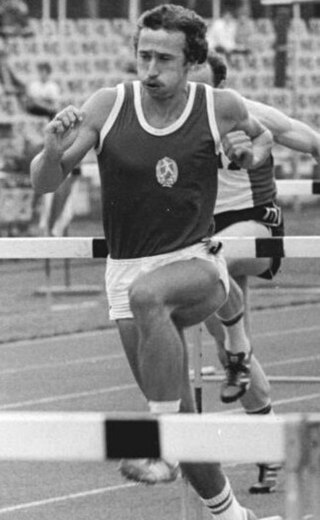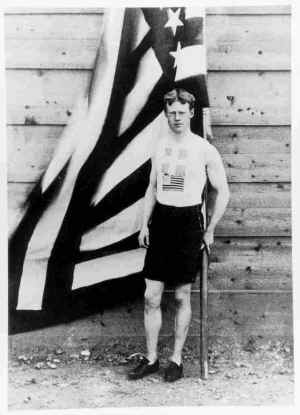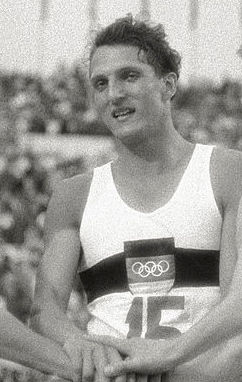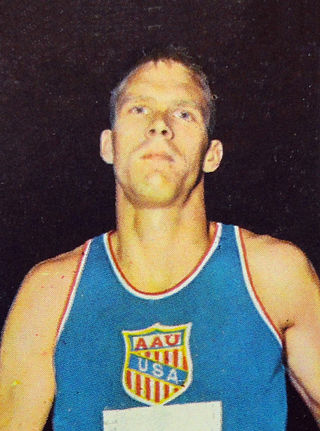Related Research Articles

Frederick Morgan Taylor was an American hurdler and the first athlete to win three Olympic medals in the 400 m hurdles. He was the flag bearer for the United States at his last Olympics in 1932.

Roger Kingdom is an American former sprint hurdler who was twice Olympic champion in the 110 meters. Kingdom set a world record of 12.92 in 1989. He is now an athletics coach and strength and conditioning coach who currently works as a speed and conditioning coach for the Tampa Bay Buccaneers of the NFL.

Thomas Munkelt is a retired East German athlete, winner of 110 m hurdles at the 1980 Summer Olympics.

Thomas Pelham Curtis was an American athlete and the winner of the 110 metres hurdles at the 1896 Summer Olympics.

Karl Martin Lauer was a West German sprinter who won a gold medal in the 4 × 100 m relay at the 1960 Summer Olympics.

Athletics has been contested at every Summer Olympics since the birth of the modern Olympic movement at the 1896 Summer Olympics. The athletics program traces its earliest roots to events used in the ancient Greek Olympics. The modern program includes track and field events, road running events, and race walking events. Cross country running was also on the program in earlier editions but it was dropped after the 1924 Summer Olympics.

Teresa Barbara Ciepły was a Polish sprinter and hurdler. She was a bronze Olympic medalist in the 4×100 metre relay at the 1960 Summer Olympics. Two years later she won gold medals in the 4 × 100 m relay and the 80 m hurdles, and a bronze medal in the 100 m sprint at the 1962 European Championships. The same year she was chosen as the Polish Sportspersonality of the year. At the 1964 Olympics she won a gold medal in the 4 × 100 m relay, in a world record time of 43.6 seconds, and a silver in the 80 m hurdles. Nationally Ciepły won the Polish titles in the 80 m hurdles and in the 100 m sprint (1960–1962).

The United States competed at the 1956 Summer Olympics in Melbourne, Australia. 297 competitors, 251 men and 46 women, took part in 139 events in 18 sports.
Patricia Girard is a French athlete who competed mainly in the 100m hurdles.
Thomas Lionel "Tom" Hill is an American former athlete, who mainly competed in the 110 metre hurdles.

Eddy Ottoz is an Italian former athlete and bronze medalist at the 1968 Summer Olympics in the 110 metre hurdles.

The men's 110 metres hurdles event at the 1984 Summer Olympics in Los Angeles, California took place on 5 and 6 August 1984. Twenty-six athletes from 17 nations competed. The maximum number of athletes per nation had been set at 3 since the 1930 Olympic Congress. The event was won by Roger Kingdom of the United States, the nation's first championship since 1972 and 16th title in the event overall. Arto Bryggare's bronze was Finland's first medal in the men's high hurdles.

Harry Ernest Wilson was a New Zealand hurdler who competed at the 1920 Summer Olympics in Antwerp and at the 1919 Inter-Allied Games in Paris. In 1920 he finished fourth in the 110 metre hurdles competition. He was the Olympic flag bearer for New Zealand in 1920.

Anthony Eugene Campbell is an American former hurdler. He is the 1988 Olympic bronze medallist in the 110m Hurdles, the 1987 World Indoor champion in the 60m hurdles, and won the 1985 World Cup title in the 110m hurdles. A three-time winner of the 110 metres hurdles at the IAAF Grand Prix Final, he also won the 1987 Overall Grand Prix title, with fellow hurdler Greg Foster second and pole vaulter Sergey Bubka third.

The men's 110 metres hurdles at the 1980 Summer Olympics in Moscow, Soviet Union had an entry list of 23 competitors from 16 nations, with three qualifying heats and two semifinals (16) before the final (8) took place on Sunday 27 July 1980. The maximum number of athletes per nation had been set at 3 since the 1930 Olympic Congress. The event was won by Thomas Munkelt of East Germany, the first medal by a German runner in the event. Alejandro Casañas of Cuba took silver for the second Games in a row, making him the eighth man with two medals in the event. Aleksandr Puchkov's bronze was the Soviet Union's second medal in the event and first since 1964.
Eric Ashley Thomas was an American hurdler who represented his native country at the 2000 Summer Olympics in Sydney, Australia. He set his personal best (47.94) in the men's 400 m hurdles event on June 13, 2000, in Rome, Italy.

Ronald Howard "Ron" Whitney is a retired American hurdler and sprinter. Known for his fast finish, he was sixth in the 400 m hurdles at the 1968 Summer Olympics. He had entered the race as one of the favorites, having been ranked #1 in the world in 1967 and winning the USA Outdoor Track and Field Championships in the event for the second time earlier that year. At the Olympics, his first heat victory established a new Olympic record, only to be surpassed by David Hemery two days later.

Pascal Martinot-Lagarde is a French athlete who specialises in the sprint hurdles.

The African island nation of São Tomé and Príncipe competed at the 2012 Summer Olympics in London, held from 27 July to 12 August 2012. This was the nation's fifth appearance at the Olympics since its debut in 1996. Two track and field athletes, Christopher Lima da Costa and Lecabela Quaresma were selected to the team by wildcard places, without having qualified at any sporting event. Quaresma was selected as flag bearer for the opening and closing ceremonies. Neither of the two athletes progressed beyond the first round of their respective events.

The sprint hurdles at the Summer Olympics have been contested over a variety of distances at the multi-sport event. The men's 110 metres hurdles has been present on the Olympic athletics programme since the first edition in 1896. A men's 200 metres hurdles was also briefly held, from 1900 to 1904. The first women's sprint hurdling event was added to the programme at the 1932 Olympics in the form of the 80 metres hurdles. At the 1972 Games the women's distance was extended to the 100 metres hurdles, which is the current international standard.
References
- ↑ Evans, Hilary; Gjerde, Arild; Heijmans, Jeroen; Mallon, Bill; et al. "Thomas Futterknecht Olympic Results". Olympics at Sports-Reference.com. Sports Reference LLC. Archived from the original on 18 April 2020. Retrieved 6 October 2017.